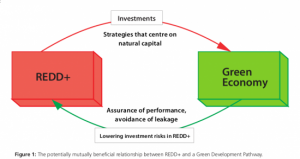REDD+ and a Green Economy: Opportunities for a mutually supportive relationship (UN REDD)
United Nations REDD programme / 2012
 This briefing argues the REDD programme (Reducing Emissions from Deforestation and Forest Degradation in developing countries) is urgently needed to tackle the 15-17% of greenhouse gases caused by deforestation and forest degradation.
This briefing argues the REDD programme (Reducing Emissions from Deforestation and Forest Degradation in developing countries) is urgently needed to tackle the 15-17% of greenhouse gases caused by deforestation and forest degradation.
Read report
The authors go on to say that as well as reducing deforestation REDD+ can promote economic growth and reduce poverty as part of a green economy. A green economy is defined as resulting in “improved human well-being and social equity, while significantly reducing environmental risks and ecological scarcities” (UNEP).
UN-REDD says investments in REDD+ can contribute to a ‘virtuous cycle’ of investments in natural and human capitals that are a catalyst for green development.
REDD+ is potentially the first step in a new natural capital centric investment strategy which would lead to a shift in economic thinking that recognises planetary limits and internalises externalities. This would resolve the current ‘market failure’ whereby deforestation contributes to climate change. Currently developing countries have the option to exploit their natural capital to achieve development but in the future would choose not to.
According to the briefing REDD+ investments can be used to encourage conservation of other environmental services that can also contribute to green development. “Thus REDD+ would deliver not only direct investments in forests but it would also help to lower thresholds for other investments into ecosystem services and the conservation of biodiversity.”
Currently just US$70 million a year is spent on forests. This should be US$40 billion by 2030 for “afforestation and forest conservation and paying forest landholders and users to conserve forests and improve forest management”.
The authors conclude that the majority of this financing will need to come from the private sector at a time of budget cuts and overseas aid is falling. However, a crucial precondition for private sector involvement is clear undisputed land ownership. Compliance with environmental and social safeguards should be seen as enablers of private and public sector involvement in REDD+.
Another crucial area for investments to focus on is the ‘GDP of the poor’ who usually depend on forests for their livelihoods. For example if there is an increase in GDP from agricultural labour productivity this has a significant impact on income levels.
Read report
————————————
This summary was prepared by Why Green Economy?. The views expressed have been paraphrased. See the original source for more information.

Leave a Reply